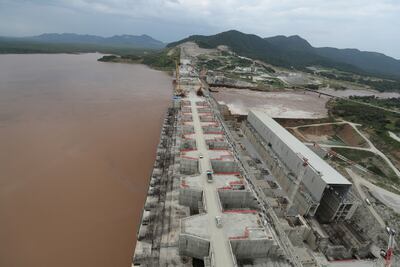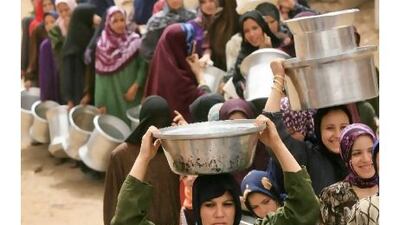President Abdel Fattah El Sisi on Monday threatened to deny state-subsidised food and services to Egyptians who illegally interfere with the country’s water resources, irrigation network or farmlands.
The visibly angry Egyptian leader also said that, if needed, he would deploy army troops to remove violations.
He gave authorities six months to deal with the problem.
Mr El Sisi’s outburst during a ceremony marking the inauguration of a water treatment plant is a reflection of the limited fresh water resources available to Egypt’s 100 million people and his government’s high-octane drive to reduce water waste through multibillion dollar projects.
Also compounding Egypt’s water woes is a huge hydroelectric Nile dam being built by Ethiopia that Cairo fears would significantly reduce its share of the river’s water - on which Egypt depends for more than 90 per cent of its fresh water needs. This could have a disastrous effect on its large agricultural sector, jobs and delicate food balance.
“We are racing against time to restore the full potential of our water resources. I want all violations removed in six months. We are not going to beg anyone who encroached on state-owned land,” Mr El Sisi said.

“I am saying to every Egyptian that anyone who violates farmlands or irrigation canals will be denied all government subsidies, whether that is food or anything else, until the violation is removed,” he said.
An army general elected president seven years ago, Mr El Sisi said a year ago that he would deploy the army in “every village” to halt the destructive and rapid encroachment of illegal construction on farmland in the mainly desert nation.
But his threat on Monday to deny the violators state-subsidised food and services was his first. Egypt’s subsidy system covers more than 60 million people who receive basic food items such as bread, rice, sugar, tea, pasta and cooking oil at prices significantly lower than market levels.
The government also subsidises utilities, fuel, health care and education, although it has reduced some subsidies since 2016 as part of an ambitious reform programme agreed with the International Monetary Fund.
Returning after a short break during Monday’s ceremony, a calmer El Sisi spoke again about the issue of encroachment on farmlands and the irrigation network.
He said he has frequently been advised not to publicly address issues that would not endear him to Egyptians.
He said: “They tell me ‘be nice and sweet’. But no! Nations are not built with laxity and shoulder-patting but rather with work, seriousness and commitment.
“By God, you are destroying your country,” he said, addressing violators. "I am saying to all officials not to remain silent when they see wrong … You have six months and I want everything back to its condition 30 years ago, by the book. Everything that is wrong in Egypt will be redressed as long as I am occupying this position.”
Reducing water waste, he explained, was a matter of national security. His government, he added, was carrying out a project costing up to 80 billion pounds to reinforce the bed and banks of up to 30,000 kilometres of irrigation canals nationwide to reduce water waste.
“What we are undertaking is beyond imagination and I will not tolerate anyone abusing or undermining what we do for the benefit of the people.”
As well as the work being done on irrigation canals, Egypt under Mr El Sisi has invested heavily in water treatment and desalination plants.
Separately, it has been trying to persuade Ethiopia to enter a legally binding agreement on the filling and operation of its Nile dam as well as mechanisms to resolve future disputes and handle droughts.

Ethiopia has declined to do that in a decade of on-off negotiations. The talks also involve Sudan which, like Egypt, is a downstream nation.
Negotiations broke down in April and no date has been announced for their resumption. In a statement earlier this month, the UN Security Council urged the three nations to resume the African Union-sponsored negotiations.


